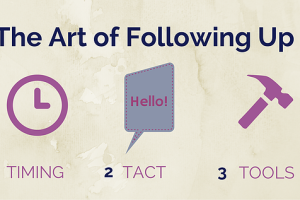Let’s face it – being a salesperson is not the most likeable profession in the world. And the prospects are not getting any easier either – they expect fully individualized treatment and nothing but. However, if you are like me, setting the bar high and surpassing your own personal goals is the true motivator in life. It is through challenging yourself constantly that you can see what you are made of. This is why I like this profession – it motivates me to find new ways of reinventing myself and my approach to the job. That said – here are some insights from my experienced colleagues and me on how to be better at sales.
Go easy on your prospects.
Knowing that I work in sales, my neighbor started complaining to me the other day about irksome calls she was getting from people offering her services she did not have even the faintest interest in buying. She said, “I don’t even know what they are offering, but the way they are, pushy, makes me want to hang up before hearing what they have to say!” She added that she understands that it is someone’s job to call, but what she minded was their aggressive approach. In the end, the easiest thing for her was to just hang up, which she considered a very rude thing to do. (My neighbor is a nice, old French lady who cares a lot about her manners.)
One thing stayed with me: she said that half of the time she does not even understand what ‘these people on the phone’ are going on about.
Many times I have witnessed young, eager sales reps being too aggressive and fast in their calls, thus not leaving the time to the other side to consider the offer. The pushy attitude triggers the prospect to automatically hang up.
That made me wonder: how many chances do sales reps miss out on because they were not patient enough?
Next time, before going full-on with regurgitating the well-rehearsed facts about your product, you might consider taking it easy. Take a deep sigh and slowly approach the conversation. Your goal is to start a dialogue, not a monologue.
Do not flood your prospect with too much too soon. Give a brief intro, preferably one sentence long, about your company and what it does (presented from the prospect’s perspective) and then ask them an engaging question which could lead to an actual conversation.
The same goes for sending out cold emails: quickly explain what you do and offer to send a short summary if the prospect is interested. If they reply, you can provide more information (but not too much as you still want to stick with the anti-overload approach) and ask them questions which will help you gauge their needs and come up with a suitable offer.
Treat your prospects like human beings.
A very good friend of mine, a sales rep who was called the Shark in his last company because of his insane quotas, gave me a great piece of advice earlier in my career, “Always smile when you are making calls.” People will feel your good mood and react to it positively. Be warm and approachable — they are more likely to open up and share their concerns with you if you come across as a trustworthy, considerate person who wants to help them.
If you notice that a prospect is clamming up after they first responded with interest, do not give in to their weak excuses but try to get to the bottom of their reasons for changing their mind. Ask genuine questions, such as, “I feel that there is something that is bothering you. Am I missing something?” or, “I sense some hesitation in your voice – can I hear what caused it?” By seeming honestly interested in hearing the answers, you give your prospects the impression of a credible and reliable person. Prospects are far more likely to open up to someone who treats them as a human being.
You need to create safety and trust in your relationship with prospects – and it all starts with your voice. Use a warm, soft voice. Imagine you are talking to an old, childhood friend whom you have not seen for a long time. By projecting your emotions onto your sales conversation, you will encourage your prospects to confide in you. And the more they share, the easier it will be for you to find the most suitable option for their needs.
Keep an eye on your data.
How often do you check if your database is up-to-date?
Prospects change their jobs, emails and titles, and companies go out of business. A research by ZoomInfo shows just how fast contacts in your database can become obsolete:
- every year about 30% of people change jobs,
- 66% of people change title,
- 43% of people change phone number,
- 37% of people change email address.
Moreover, the amount of contact data for an average B2B company doubles every 1-1.5 year. This just shows that keeping an eye on your database is not something you should leave for ‘tomorrow’. Pitching to contacts that are long gone is a waste of valuable time – time that could be spent on prospects that are actually still around.
Having the right content for the right person is not going to do you much good if you send it to the wrong address. The more information you have about the company’s contacts, the easier it will be to target the right person. The minimum that you should take into consideration when segmenting your data is persona, industry, company and job function. Consider also including a little more about each company – current marketing campaign, business articles that mentioned them – because this will help you tailor the right content for them.
Bottom line:
Great sales reps are better than average ones because they keep an organized database, do detailed research on their prospects, and treat them as human beings and not just another call.









Speak Your Mind